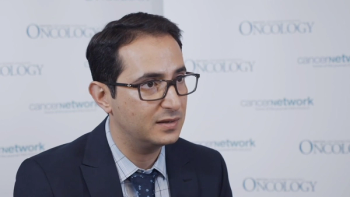
Cancer Network spoke with Hussein Abdul-Hassan Tawbi, MD, PhD, on the results of a phase II study of oral azacitidine in combination with pembrolizumab in metastatic melanoma.

Your AI-Trained Oncology Knowledge Connection!


Cancer Network spoke with Hussein Abdul-Hassan Tawbi, MD, PhD, on the results of a phase II study of oral azacitidine in combination with pembrolizumab in metastatic melanoma.

Cancer Network spoke with Anna Pavlick, MD, of NYU's Perlmutter Cancer Center, regarding whether there is one correct answer to front-line therapy for the treatment of advanced melanoma.

Cancer Network spoke with Thomas Gajewski, MD, PhD, of the University of Chicago Medical Center, about analyzing the tumor microenvironment to guide immunotherapy in melanoma.

Cancer Network spoke with Janice M. Mehnert, MD, of Rutgers Cancer Institute, about the use of immunotherapy vs BRAF/MEK inhibitors in the adjuvant setting for melanoma.

Cancer Network spoke with Ryan J. Sullivan, MD, of Massachusetts General Hospital, about the debate between immunotherapy sequencing vs targeted therapy for melanoma.

Cancer Network spoke with Hope S. Rugo, MD, of the University of California, San Francisco, about the results of the phase III SOPHIA trial in HER2-positive breast cancer.
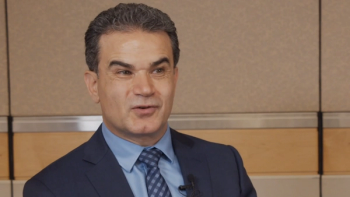
Cancer Network spoke with Ahmad Tarhini, MD, PhD, about the results of the phase III United States Intergroup E1609 trial, presented at ASCO 2019.

Cancer Network spoke with Rimas V. Lukas, MD, of Northwestern University Feinberg School of Medicine, about the combination of controlled interleukin-12 with a PD-1 inhibitor in recurrent glioblastoma.
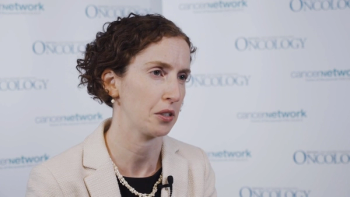

Cancer Network spoke with Karen L. Reckamp, MD, of City of Hope, about the link between several gene mutations and lung cancer in smokers vs nonsmokers.
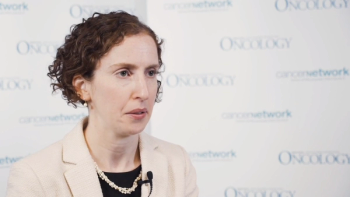
Cancer Network spoke with Anna F. Farago, MD, of Massachusetts General Hospital, about the effect of trilaciclib on myelosuppression in patients with previously treated extensive-stage small-cell lung cancer receiving topotecan.

Cancer Network spoke with Kathryn Cecilia Arbour, MD, of Memorial Sloan-Kettering Cancer Center, about the most recent research on checkpoint inhibitors in oncology.
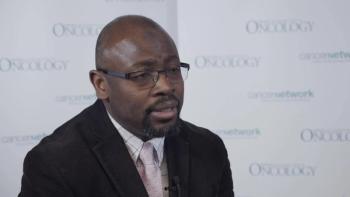
Cancer Network spoke with Taofeek Kunle Owonikoko, MD, PhD, of Emory University, about talazoparib for patients with HRRD-positive stage IV squamous cell lung cancer.

Cancer Network spoke with Suresh S. Ramalingam, MD, of Emory University, about pemetrexed, bevacizumab, or both for advanced non-squamous NSCLC.
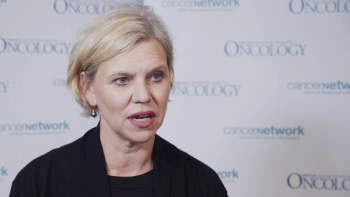
Cancer Network spoke with Yoland Catherine Antill, MD, of Cabrini Health, about the phase II PHAEDRA trial, which tested the activity of durvalumab in advanced endometrial cancer according to mismatch repair status.

Cancer Network spoke with Jason Westin, MD, of MD Anderson Cancer Center, about the Smart Start trial, which showed that a combination of targeted therapy prior to chemotherapy proved to be effective in patients with DLBCL.

Cancer Network spoke with Daniel George, MD, of Duke Health, about the treatment landscape and current trials for renal cell carcinoma.
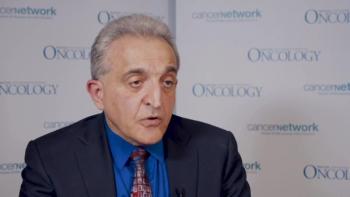
Cancer Network spoke with Mehmet Sitki Copur, MD, of Morrison Cancer Center, about his work in multiplex genomic testing as part of a 4-year experience in 2 community practices in central rural Nebraska.

Cancer Network spoke with Steven H. Lin, MD, PhD, of MD Anderson Cancer Center, on the findings of a phase II trial of atezolizumab plus chemoradiation therapy in locally advanced non-small-cell lung cancer.

In this video, Shirish M. Gadgeel, MD, of Rogel Cancer Center, University of Michigan, discusses combo docetaxel/trametinib in G12C or non-G12C KRAS mutation-positive, recurrent NSCLC.

Cancer Network spoke with Debu Tripathy, MD, Chair of Breast Medical Oncology at MD Anderson Cancer Center, on how ribociclib plus hormone therapy extends survival for patients with premenopausal advanced HR-positive breast cancer.

Cancer Network spoke with Daniel McFarland, DO, of Memorial Sloan Kettering Cancer Center, about building programs to prevent burnout and suicide in oncology providers.

Cancer Network spoke with Chiara Cremolini, MD, about the updated results of the phase III randomized strategy study TRIBE2, which looked at the first- and second-line treatment of unresectable metastatic colorectal cancer.
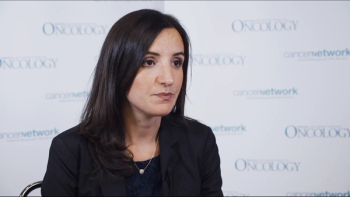
Cancer Network spoke with Hala Borno, MD, of the University of California, San Francisco, about addressing the disparities in access to clinical trials and treatments for patients with prostate cancer.

Cancer Network spoke with Patricia Eifel, MD, of the University of Texas MD Anderson Cancer Center, about the current shifts in the treatment of cervical cancer.

Cancer Network spoke with Tina Cascone, MD, of MD Anderson Cancer Center, at ASCO 2019 about combination checkpoint blockade in the pre-surgical setting for early-stage NSCLC.

In this video, Dr. McFarland of Memorial Sloan-Kettering Cancer Center spoke with Cancer Network at ASCO 2019 about depression in lung cancer and dopamine as potential therapy.

Cancer Network spoke with Karen L. Reckamp, MD, of City of Hope at ASCO 2019 about data on emerging MET inhibitors in the treatment of lung cancer patients.

Cancer Network spoke with Nathan A. Pennell, MD, PhD, of Cleveland Clinic at ASCO 2019 regarding current use of and barriers to molecular testing in NSCLC.
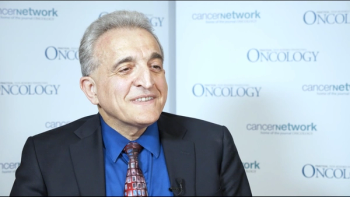
Cancer Network spoke with Mehmet Sitki Copur, MD, FACP, medical oncologist at the Morrison Cancer Center, about the most exciting research presented at ASCO in 2019.